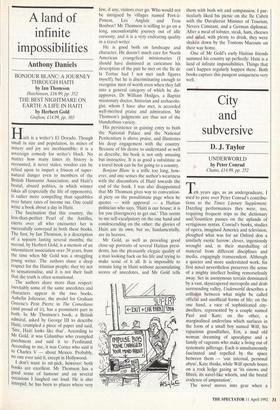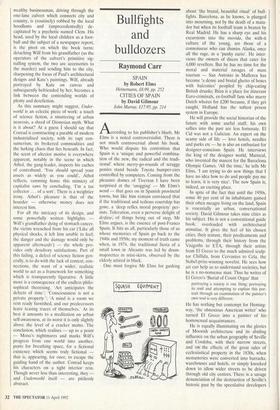City and subversive
D. J. Taylor
UNDERWORLD by Peter Conrad Chatto, L14.99, pp. 252 en years ago, as an undergraduate, I used to pore over Peter Conrad's contribu- tions to the Times Literary Supplement. Dazzling performances they were, too, requiring frequent trips to the dictionary and countless pauses on the uplands of vertiginous syntax. Conrad's books, studies of opera, imagined America and television, ploughed what was for an Oxford don a similarly exotic furrow: clever, ingeniously wrought and, in their marshalling of material from different disciplines and media, engagingly transcendent. Although a quieter and more understated work, his first novel nevertheless preserves the sense of a mighty intellect boiling remorselessly away. Set in anonymous terrain dominated by a vast, skyscrapered metropolis and drab surrounding valley, Underworld describes a collision between what might be called official and unofficial forms of life: on the one hand, a race of sophisticated city- dwellers, represented by a couple named Paul and Kate; on the other, a marginalised underclass which surfaces in the form of a small boy named Wilf, his rapacious grandfather, Em, a mad old woman dreaming of apocalypse and a family of vagrants who make a living out of systematic pilferage. Each is simultaneously fascinated and repelled by the space between them — 'our internal, personal abyss', Kate thinks, while Wilf spends hours on a rock ledge gazing at 'its sinews and fibres, its navel-like whorls, and the brutal evidence of amputation'.
The novel moves into gear when a wealthy businessman, driving through the one-lane culvert which connects city and country, is (routinely) robbed by the local hoodlums and (unprecedentedly) de- capitated by a psychotic named Clem. His head, used by the local children as a foot- ball and the subject of a newspaper report, is the pivot on which the book turns: detaching Wilf from his grandfather (as the operators of the culvert's primitive sig- nalling system, the two are accessories to the murder) and sending him to the city, sharpening the focus of Paul's architectural designs and Kate's paintings. Wilf, already portrayed by Kate on canvas and subsequently befriended by her, becomes a link between the contending worlds of plenty and dereliction.
As this summary might suggest, Under- world is an eclectic piece of work: a touch of science fiction, a smattering of urban neurosis, a shred of Dionysian myth. What is it about? At a guess I should say that Conrad is constructing a parable of modern industrialised society, with its rapt con- sumerism, its brokered commodities and the lurking chaos that lies beneath. In fact, the scent of ulterior motive is everywhere apparent, notably in the scene in which Athol, the gang-leader, inspects his caches of contraband. 'You should spread your assets as widely as you could', Athol reflects, ramming home this mimicry of capitalist saws by concluding, 'I'm a tax collector. ... of a sort'. There is a weightier irony. Athol's pleasure is that of the hoarder — otherwise money does not interest him.
For all the intricacy of its design, and some powerfully written highlights — Wills grandfather dying of stomach cancer, the victim wrenched from his car ('Like all physical shocks, it left him unable to feel; the danger and the damage would only be apparent afterwards') — the whole pro- vides only desultory satisfactions. Part of this failing, a defect of science fiction gen- erally, is to do with the lack of context, con- nections, the want of a wider, realistic world to act as a framework for something which is transparently figurative. A little more is a consequence of the endless philo- sophical theorising. `Art anticipates the defects of time '; `Consciousness is not a private property '; `A mind is a room we rent ready furnished, and our predecessors leave teasing traces of themselves.' At its best it amounts to a meditation on urban self-awareness, at its worst it is only slightly above the level of a cracker motto. The conclusion, which realises — up to a point — Mona's nightmares and marks Wills progress from one world into another, pants for breathing space, for a fictional existence which seems truly fictional -- that is, appearing, for once, to escape the guiding hand of the author. Conrad keeps his characters on a tight interior rein. Though never less than interesting, they — and Underworld itself — are pitilessly abstract.



















































 Previous page
Previous page